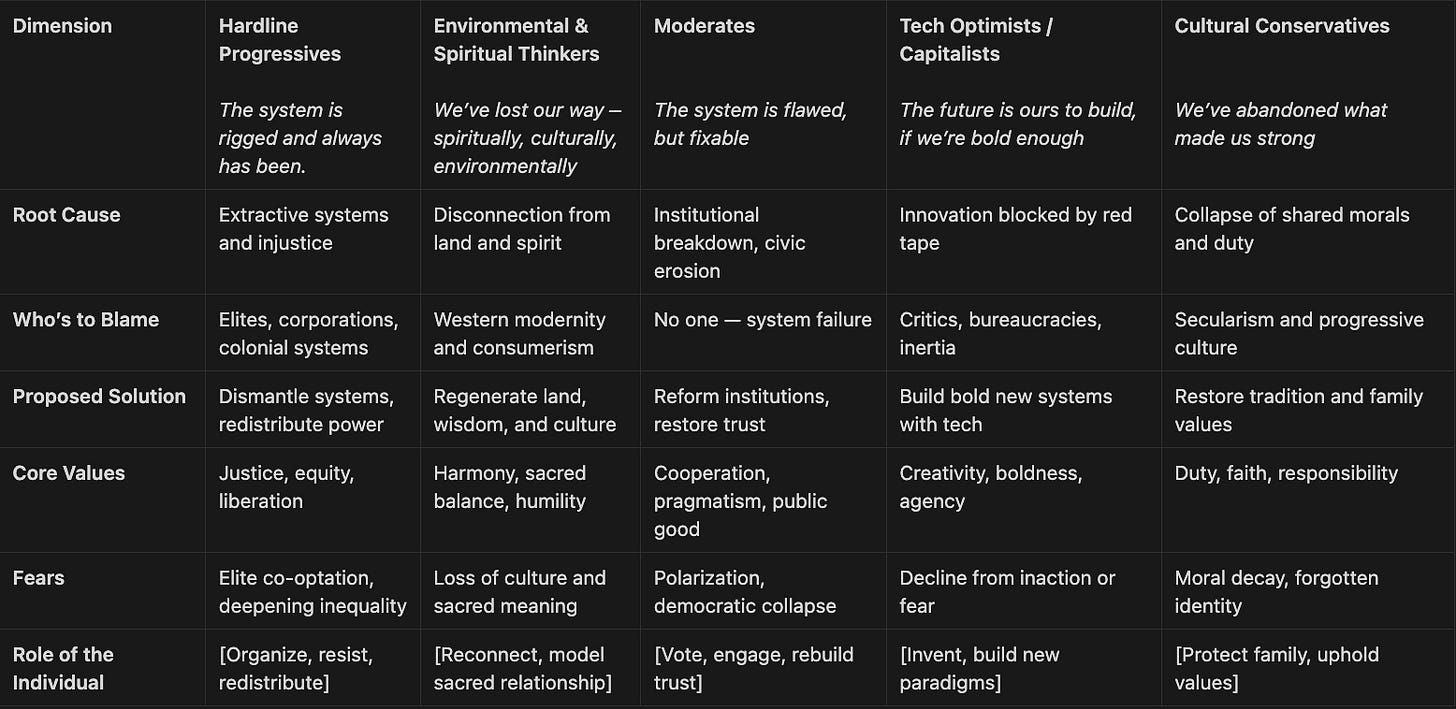the common ground hiding in plain sight
bridging our divides is the most impactful move we can make.
Culture Carrier is about equipping ourselves with tools to be a force for good.
Not in a naive power-of-positive-thinking kind of way, but in a call-the-game-straight-and-find-your-leverage kind of way. Here, we look for places where people with good intentions can actually make a difference.
For my money, bridging our divides is the most worthwhile cause we can commit to. Before we debate issues or policy positions, this is where we have to start. The fundamentals. That we’re all on this spinning rock together, and we have to find a way to make it work together.
Because what’s the alternative?
why it matters
We can’t solve problems in siloes. If we go back to the basics, we know evolution didn’t select for humans. It selected for groups of humans. We’re here today because we united behind shared goals and built the things that make life possible. In a world strung out on division and loneliness, we can’t forget that. We’re an inherently special species.
Writer Tim Urban puts it nicely:
"By uniting through shared beliefs, shared culture, shared values, or shared interests, we shattered the previous ceiling…achieved something other complex animals couldn't: mass cooperation. When you take the already impressive power of human cognition and combine it with the capability of mass cooperation, you have a species with superpowers.”
Today, that superpower is offline — and we mostly know why. Social media broke our discourse. Trust in journalism is in free fall. Outrage drives the media ecosystem. It may be old news, but it’s still the water we’re swimming in.
So now what? When every mainstream conversation about anything important seems to fall apart, how can we rebuild our ability to solve big problems?
Look, I’m no doomer… but we’re facing some pretty humanity-scale problems. AI governance. Ecosystem collapse. Institutional decay. It’s a lot. And yet, it feels like we’ve never been less equipped to scale solutions.
Call me naive, but I still believe we can find a way to come together. Solving our biggest problems depends on it. But first we need to understand how different people diagnose what’s gone wrong.
finding common ground
So I started with a question:
If we all know things aren’t working — even if we disagree on why — where can we find alignment?
What’s beneath the surface-level disagreement?
To get a clearer picture, I mapped how five dominant worldviews in America — progressives, environmental/spiritual thinkers, moderates, tech optimists, and conservatives — each see the current moment.
I examined how each group answers the big questions: What went wrong? Who's to blame? What are the solutions? The exercise highlighted some pretty troubling divides, but it also brought real insights.
The SparkNotes version:
Progressives see structural injustice — capitalism, colonialism, extractive economics.
Environmentalists see disconnection from the land, ancestry, and spirit.
Moderates see institutional failure and weakened trust.
Tech optimists and capitalists see outdated institutions and red tape as barriers to progress and solutions.
Conservatives see moral decay and a decline in traditional values.
Same overwhelming moment, completely different diagnoses.
If interested, you can explore the full map here.
⸻
the reality we share
I set out to understand different perspectives, but what emerged was an emotional undercurrent running through all of them.
Here’s what we all share:
Fear: The sense that something important is being lost or threatened. The world feels less safe, stable, or recognizable than ever.
Think: Parent worried about their child’s future in a culture they no longer understand
Overwhelm: The pace of change is relentless. Too much information, crisis fatigue, too little clarity on what’s real or what matters.
Think: Young person bouncing between climate news, job insecurity, and digital burnout — unsure where to begin.
Hope: A better future feels possible, but only with some form of decisive action. We all believe solutions, innovation, and forward motion are possible and pivotal.
Think: Organizer rallying their community or teacher helping students see a better future.
Every political stance can be traced back to one of these.
Climate activism? Hope + fear.
Tech optimism? Hope.
Cultural conservatism? Fear.
Progressive reform? Hope and overwhelm.
⸻
bringing our superpower back online
Since coming to this realization, I’ve found that this simple lens — fear, overwhelm, or hope — cuts through the noise and gets to the human underneath.
Once I saw that every heated exchange or charged take is someone processing the same uncertainty I am, I couldn’t unsee it. The disagreements didn’t vanish, but they did become a bit more workable. Because I was no longer debating an adversary — I was moving through a complex world with a fellow human being.
Here's how it works in practice: Say a family member posts something about "woke schools destroying America." Instead of rolling your eyes and saying he's an idiot, you throw the lens on: is this coming from fear, overwhelm, or hope? Probably fear. He's worried about losing something he values about how kids should be raised. Suddenly you're not arguing with a bigot, you're talking to someone who cares about kids and feels like the world is changing too fast. The conversation changes.
And here's the thing - when enough of us start doing this, the culture can shift. Subtly but tangibly. Instead of two sides talking past each other, you get people going against the grain to find unity points. And that's how we restitch the social fabric, one conversation at a time.
If you take one thing from this week’s issue, let it be this:
Next time someone shares a view that frustrates you, choose to go inward. Ask yourself where they’re coming from. Empathize. Because in this complicated moment, we’re all called to employ different approaches.
If not us, who?
Jay



